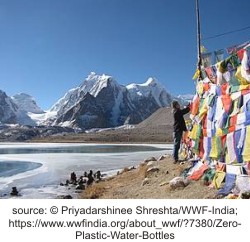|
When Communities
In a pristine area in the lap of the Himalayas is the beautiful, clear and holy Gurudongmar Lake. It is the biggest glacial wetland in Sikkim, considered sacred by many local communities.
Lachen in Sikkim, is an overnight stopover
for about 15,000 tourists who visit the lake annually. The village has
about 300 households, thirty of which function as hotels and some have
converted to homestays. As the number of tourists visiting Sikkim has
risen over the last two decades, the tourist hotspots have witnessed
some major littering and solid waste management challenges. Data shows
that the estimated number of tourists that visited Sikkim rose from 5.52
lakhs in 2011 to 13.75 lakhs in 2017, a staggering increase of 149% in 6
years. It consequently became common place to see heaps of plastic
bottles, tetra packs and plastic packaging of commercially available
food items in the villages and along boundaries of the Gurudingmar lake,
worshipped by the natives. The choked drains and littered spots became
aesthetic and drainage hazards, to counter which the Lachen Tourism
Development Committee (LTDC) conducted routine clean-up drives at the
end of the tourist season
The initiative, though well-intended, ended up in adding toxins to the air because burning was the sole option to manage the non-biodegradable waste. In 2012, WWF-India then took a pioneering step, in collaboration and with support from the Lachen Dzumsa (local administrative body) and the LTDC, to exercise a complete ban on the use and sale of packaged/bottled drinking water in Lachen. The Dzumsa legislation has been majorly successful because the Lachenpas (the native Lachen residents) have dedicatedly arranged for safe, alternative provisions for drinking water for the tourists. With financial support by the USAID Asia High Mountains programme, WWF-India distributed water filters to some hotels, stalls and homestays to ease the transition for the tourists and those who earned livelihoods by hosting them. The LTDC and WWF-India also made it mandatory for testing the available drinking water at a facility set up by the State Institute of Rural Development, to certify it as fit for human consumption. At many cafes and hotels in Lachen, the certificate is displayed to evoke trust and a sense of security in the tourists. The ban has undeterred cooperation from the hotels association, taxi drivers union and the local police who also help monitor inflow of plastic bottles into the territory. At the Lachen entry check-post, the police personnel check all tourist vehicles for plastic bottles and sensitise tourists by organising awareness drives and distributing stickers.
With immense motivation and a hugely
positive feedback to this milestone initiative, the Dzumsa has now also
planned development of a waste recovery centre in the area, with support
from the state’s Rural Management and Development Department and WWF-India;
and is constantly expanding their eco-tourism offerings by developing
nature trails, training bird guides etc. to provide sustainable
livelihoods to the local people. At the waste recovery facility, the
plan is to develop a segregation centre and dispatch the
non-biodegradable material to a nearby waste trader and enable reuse
wherever feasible, such as for filling in cushions and pillows and
knitting into bags and bins.
Kavya Arora
|
 annually.
annually.